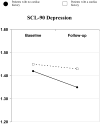The impact of angina and cardiac history on health-related quality of life and depression in coronary heart disease patients
- PMID: 18072698
- PMCID: PMC2924368
- DOI: 10.1177/1742395307079192
The impact of angina and cardiac history on health-related quality of life and depression in coronary heart disease patients
Abstract
Objective: To prospectively examine the contribution of angina and cardiac history to health-related quality of life (HRQoL) and depression in cardiac patients, over 6 months post-hospitalization.
Methods: Participants were myocardial infarction (MI), percutaneous coronary intervention (PCI) or coronary artery bypass graft (CABG) outpatients under the age of 70 years. One hundred and seventy-one patients consented to participate, with 121 patients being retained 6 months later (71% response rate). The impact of the patient's cardiac history and the presence of angina on physical, social and emotional HRQoL and depression was examined.
Results: At baseline, cardiac history was not significantly related to any of the dimensions of HRQoL or depression. At 6-month follow-up, cardiac history significantly predicted a higher level of depression, and angina was predictive of a significantly worse emotional, physical and social HRQoL and a higher level of depression.
Discussion: The presence of a cardiac history is associated with depression 6 months post-cardiac event, and angina is associated with both an adverse HRQoL and higher levels of depression. As past research has demonstrated that depression is a risk factor for mortality in patients with established heart disease, it is important from both a clinical and a research perspective to address these issues.
Figures
References
-
- Taylor S. Health Psychology. Los Angeles: McGraw Hill; 2003.
-
- Sieber WJ, Kaplan RM. Assessing the Utility of Behavioral Medicine Interventions: Quantifying Health-Related Quality of Life. Brunner – Routledge. 2001
-
- Roebuck A, Furze G, Thompson DR. Health-related quality of life after myocardial infarction: an interview study. J Adv Nurs. 2001;34(6):787–94. - PubMed
Publication types
MeSH terms
Grants and funding
LinkOut - more resources
Full Text Sources
Medical
Research Materials
Miscellaneous


